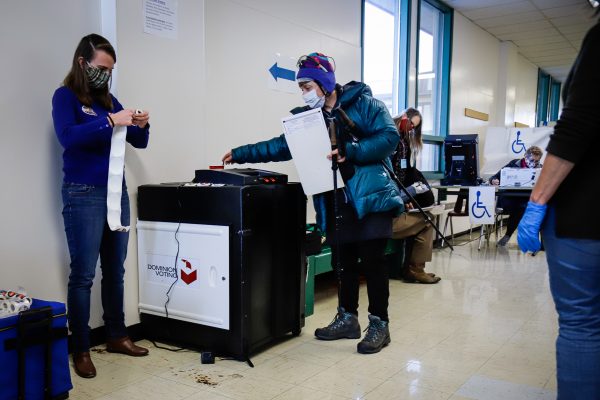
Usually on Alaska’s Election Night, the big story is the votes that are counted. But in a year unlike any other, Tuesday’s takeaway was about the votes that still remained to be counted.
Amid the COVID-19 pandemic, more than 120,000 Alaskans cast absentee and early votes that won’t be counted until next week. Another 40,000 absentee ballots were mailed to Alaskans and haven’t been returned, and will be counted as long as they’re postmarked by Election Day and received by the state by legal deadlines later this month.
And even as of midnight Wednesday, state officials had only counted a total of about 130,000 votes that came from about half of Election Day polling places, with the other half of polling places still not reporting results — meaning that altogether, more than half of all ballots still remain to be counted.
The huge number of outstanding votes left some candidates and campaigns that appeared comfortably ahead still hedging their bets late Tuesday. The campaign against the citizens initiative to raise oil taxes was leading by some 35,000 votes late Tuesday, or about 64% to 46%.
But Kara Moriarty, an oil industry trade group leader who managed the opposition campaign, said only that she was “cautiously optimistic that these early numbers will hold.”
“We know that between absentees and early votes, we could be looking at 150,000 Alaskan ballots that haven’t been counted yet,” she said in a phone interview. “While the margin is very healthy at this point, we don’t feel comfortable calling the election.”
RELATED: With more than 100,000 ballots still to count, Alaska campaigns cross fingers and crunch numbers
Others were more emphatic with their conclusions.
Republican U.S. Senator Dan Sullivan’s lead over Democratic Party-endorsed independent Al Gross was almost identical to Moriarty’s group’s edge in the oil-tax campaign.
But in a speech at his Election Night party, Sullivan struck a more confident tone, even as he said that “every vote will count.”
“The people have spoken. They have spoken loudly,” Sullivan said, drawing cheers. “Right now, the latest numbers have us up close to 30 points on our opponent.”
Gross, meanwhile, didn’t even hint toward a concession.
His campaign sent a copy of Gross’ Election Night speech, in which the independent candidate said that “victory is within reach” — even though he trails Sullivan by 37,000 votes.
Before Election Night, political observers said they expected early results to tilt toward Republicans, while ballots that won’t be counted until next week are likely to be more favorable for independents and Democratic candidates. But just how much Tuesday’s results could change won’t be known until officials start counting the remaining absentee and early ballots next week.
A torrent of Democratic absentee ballots could reverse Alaska’s Election Night vote counts
As for state legislative races, lawmakers typically begin scrambling on Election Night to start hashing out leadership posts and committee positions for the upcoming session that starts in January.
But the current House Speaker, independent Bryce Edgmon of Dillingham, said those conversations haven’t started this year in the same way.
“Most of us recognize that this is a two-round process. We got through the first round tonight; the second round will be at least a week and possibly until the bitter end when all of the stragglers come in and all the votes have been counted,” Edgmon said in a phone interview. “At least the people I’m talking with, I don’t think they’re making their political beds just quite yet.”
Coming amid the COVID-19 pandemic, this year’s election season has been unlike any other in Alaska history — and that applied to Election Night, as well. But Moriarty, the oil tax opposition campaign’s manager, said that in a way, the strangeness was expected.
“In some ways, it’s just like, ‘Oh, of course we’re going to have to wait another week. It’s 2020,” she said. “I mean, why wouldn’t we?”
Until the outstanding absentee and early ballots are counted starting next week, Moriarty said that her campaign will take down signs, clear out offices and catch up on family time.
Other than that, she added: “There’s nothing to do but wait.”
Nathaniel Herz is an Anchorage-based journalist. He's been a reporter in Alaska for a decade, and is currently reporting for Alaska Public Media. Find more of his work by subscribing to his newsletter, Northern Journal, at natherz.substack.com. Reach him at natherz@gmail.com.




